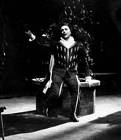ORFEO International – Reviews
Important Releases Briefly Introduced
May 2009
ORFEO 1 CD C 770 091 B
Waldemar Kmentt
In 1955, he was already singing Jaquino in the production of Beethoven’s Fidelio for the reopening of the Vienna State Opera, and performed internationally in roles such as Mirko Zeta in The Merry Widow until the turn of the century. During all this time, the tenor Waldemar Kmentt gave countless dazzling performances on the world’s greatest opera stages. From lyric tenor to roles bordering on youthful heroic tenor, there is hardly a part he has not sung. 
Waldemar Kmentt as Faust
Foto: Fayer, Wien
Waldemar Kmentt as Hans
Foto: Fayer, Wien
Waldemar Kmentt as Ramiro
Foto: Fayer, WienThis portrait in honour of his 80th birthday is an impressive reflection of his versatility, with excerpts from roles he performed at the Vienna State Opera, where he was always based, even when travelling for guest performances between Bayreuth and Buenos Aires, and where he received the title of “Kammersänger” and was eventually made an honorary member. The flexibility and brilliant timbre of his voice brought him many roles at the State Opera, both in the legendary Mozart Ensemble under Karl Böhm and as an ‘Italian’ tenor (though, as usual at that time, mostly in German). Thus the portrait includes his Idomeneo and Ferrando in Così fan tutte as well as Don Ramiro in La Cenerentola. Not quite so well-known is the fact that Kmentt increasingly sang the French fach in the 1960s; the excerpt included in the CD is Gounod’s Faust under Georges Prêtre – here in the original language, with Wilma Lipp. His duet with Anja Silja from Offenbach’s Tales of Hoffmann (under Josef Krips) testifies to Kmentt’s exceptional talent as a musical partner. This is also evident in his performance of Janacék’s Jenufa together with Sena Jurinac, as well as in the dialogue with Peter Weber’s Music Master in Strauss’s Ariadne auf Naxos, where, in a 1996 recording of the speaking part of the Major-Domo, Waldemar Kmentt’s precise articulation and vocal skill are clearly audible. Thus it is hardly surprising that even in less frequently performed works such as Gluck’s Iphigenie auf Tauris (Pylade) and Stravinsky’s classicistic The Rake’s Progress, he gave a striking though lyrical portrayal of his characters – and also a brilliant rendering of dreaded short roles such as the Italian tenor in Strauss’s Rosenkavalier at the première of the opera in 1968 under Leonard Bernstein. This aria concludes the cross-section of the prodigious career of a tenor who, ever modest, never relied on mere showmanship.
top |